
Wenning was born in 1958 in Leverkusen, a town that Bayer had itself created to house employees over a century earlier. Armed with nothing more than a secondary school education Wenning entered Bayer via a training programme and from there began to work his way up through the ranks of power.
Wenning trained in Bayer’s finance and accounting department for a year, followed by an additional year in the company’s Corporate Auditing Department. His outstanding performance in this role earned him, in 1970, the opportunity to manage the finance and accounting for Bayer International, a new company that had recently been formed in Peru. Following a return to Germany and a second spell in Peru, Wenning finally relocated permanently back to Leverkusen, as director of the group’s HealthCare Sector.
From this, he moved to the Plastics Business Group to head Bayer’s Germany thermoplastics marketing operations, before taking over the plastics group’s international marketing operations in 1987. In 1992 he was appointed Managing Director of Bayer Hispania International, based in Barcelona, and while there assumed the role of Senior Bayer Representative for Spain. In 1996 he moved back to Leverkusen, this time to head the Corporate Planning and Controlling Department.
Wenning was appointed to the Board of Management in 1997, also assuming the roles of CFO, Chairman of the Board’s Committee for Finance, and a member of the board’s committee for corporate coordination and human resources. At the same time he was also appointed the representative of Bayer’s Central and South American, African, and Middle Eastern markets.
Following 36 years at the company, in 2002 Wenning took over as CEO of Bayer, following the retirement of Manfred Schneider. But if anyone thought that his years of hard work and dedication would allow him an easy time at the top they would have to think again. Wenning took over as CEO during one of the most difficult periods in Bayer’s 140-year history, when profits were dwindling and the company was under worldwide scrutiny in light of litigation.
Turning the ship around
Bayer had made significant losses in the years leading up to Wenning’s appointment, a situation that was compounded by serious legal problems related to one of its pharmaceutical products, Baycol, a cholesterol-lowering medication sold as Lipobay in Europe and Baycol in the US, was withdrawn from the market because of its links to more than a hundred deaths. As a direct result of this the number of lawsuits filed against Bayer in America eventually rose to over eight thousand.
However, the situation was eased when, in 2002, Bayer was cleared of all liability in a $550m US lawsuit, although uncertainty still remained concerning the total amount of its liabilities elsewhere in the world.
Wenning made it clear that he believed Bayer’s financial situation had mostly arisen from the company’s inability to sustain growth. New pharmaceutical products, he said, require a significant period of time – from the R&D phase, through testing and regulatory approval – before they are ready to market. Whereas Bayer had products at the clinical trial stage in 2002, they were still not ready for government approval and marketing.
Another key strategy that Wenning implemented was the forming of alliances with other pharmaceutical companies, and to this end, purchased the Aventis CropScience company in 2002, which significantly raised Bayer’s sales in the agricultural science sector. Partnerships and alliances would be one new route, but a more radical scheme was to follow.
The great divide
In 2003 Wenning announced his decision to divide Bayer into two units, grouping the chemical unit together with part of the polymers unit to form a new company separate from the pharmaceutical division. This split, he said, would allow Bayer itself to focus on health care, agrochemicals, and material sciences while the new chemical division would be allowed to respond quickly the the world’s rapidly-changing pharmaceutical requirements.
The new company was to be named Lanxess. From the outset, the aim was that the company would be able to finance itself independently, and move away from classical chemistry. Bayer promoted Laxness as a competitive firm that would add value to any company. Laxness achieved a public listing in the first half of 2005.
In 2003 Bayer was pushing a range of important new pharmaceuticals to the market, including Cypro XR, an antibiotic used to treat anthrax, and Kinzalmono, a medication for the treatment of hypertension. Also in the pipeline was a challenger to Viagra – another drug for erectile dysfunction called Levitra, which was expected to bring in over $900m in annual sales. Wenning reported that Levitra had made a good start after its release, gaining gaining 14 percent of all new prescriptions by October 2003.
In recent years, in response to popular demand, Wenning has sought to increase Bayer’s commitment to environmentally-conscious projects. In late 2007, the company launched its ‘Bayer Climate Program’, a project which aims to reduce Bayer’s carbon emissions from its production facilities while further developing new solutions for increasing climate protection and dealing with climate change. Following this, in 2008, Bayer spent more than $4.2bn in R&D for climate protection-related activities – almost 10 percent of its total 2008 sales figure ($47.4bn). In addition to this, in 2009 Wenning announced plans to invest a total of $1.4bn in climate-related R&D in Asia in 2010.
In terms of corporate social responsibility, Bayer boasts the accolade of being the world’s first private company to collaborate with the United Nations Environment Program to launch environmental protection projects for youth and children worldwide.
The end of an era
In September 2009, Bayer announced that 52 year-old Dutchman Martijn Dekkers would succeed Wenning – in October 2010 – as part of a management restructuring. Dekkers can, on the one hand, be thankful that his tenure begins as global economic tensions begin to ease, but on the other hand, he will be aware that taking over from a man who implemented a complete company turnaround will be a tough act to follow.

